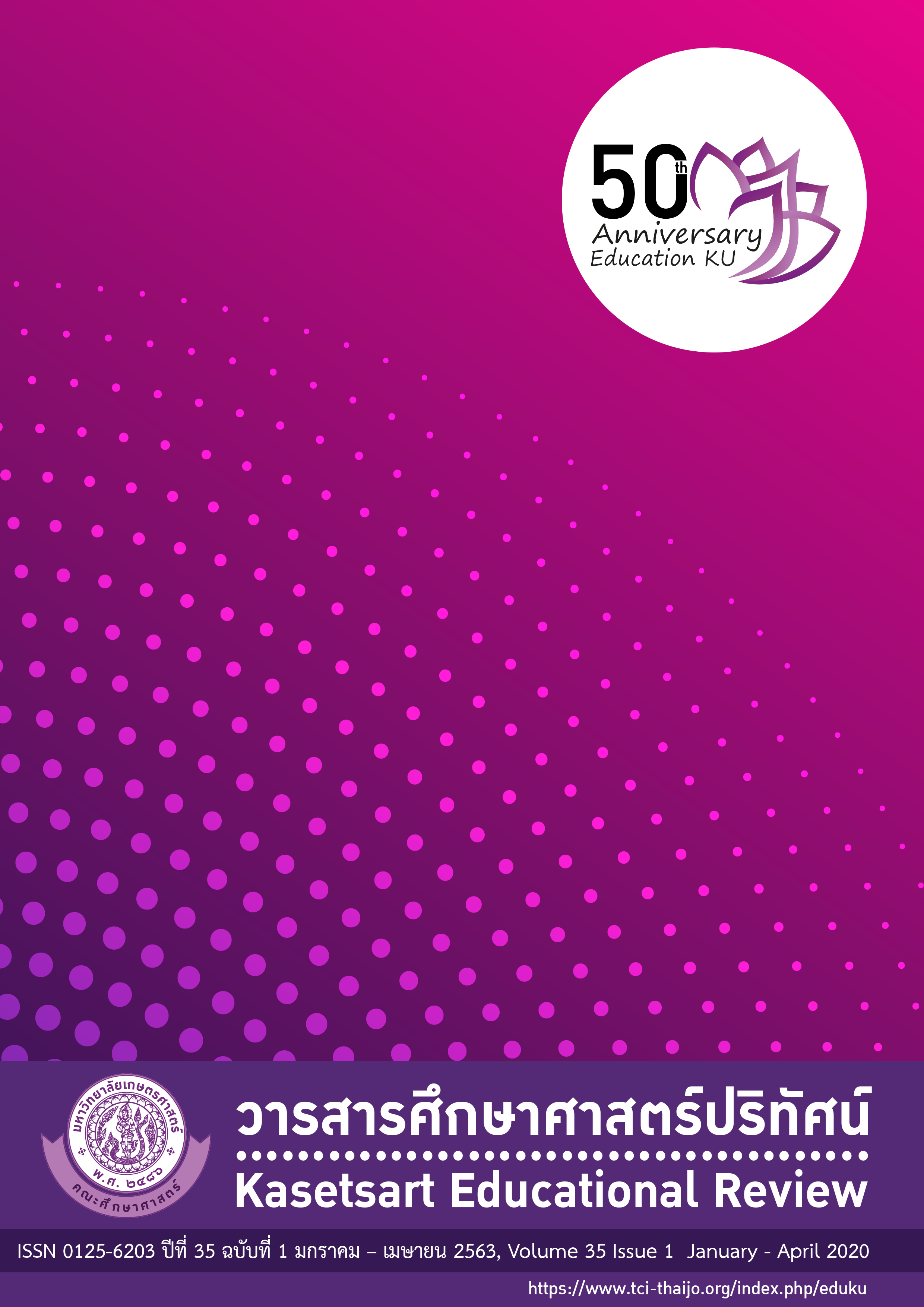ผลการจัดการเรียนรู้แบบสืบเสาะหาความรู้ 5 ขั้น โดยเน้นการสร้างคำอธิบายเชิงวิทยาศาสตร์ที่มีต่อผลสัมฤทธิ์ทางการเรียนวิทยาศาสตร์ เรื่อง ลมฟ้าอากาศ และการสร้างคำอธิบายเชิงวิทยาศาสตร์ของนักเรียนชั้นมัธยมศึกษาปีที่ 1 โรงเรียนนวมินทราชินูทิศ สวนกุหลาบวิทยาลัย ปทุมธานี จังหวัดปทุมธานี
คำสำคัญ:
การจัดการเรียนรู้แบบสืบเสาะหาความรู้ 5 ขั้น, การสร้างคำอธิบายเชิงวิทยาศาสตร์, ผลสัมฤทธิ์ทางการเรียนวิชาวิทยาศาสตร์บทคัดย่อ
การวิจัยครั้งนี้มีวัตถุประสงค์เพื่อ 1) เปรียบเทียบ ผลสัมฤทธิ์ทางการเรียนวิชาวิทยาศาสตร์ เรื่อง ลมฟ้า อากาศ ของนักเรียนชั้นมัธยมศึกษาปีที่ 1 หลังเรียน ระหว่างกลุ่มทดลองกับกลุ่มควบคุม 2) เปรียบเทียบการ สร้างคําอธิบายเชิงวิทยาศาสตร์หลังเรียนของนักเรียน ระดับชั้นมัธยมศึกษาปีที่ 1 ระหว่างกลุ่มทดลองกับกลุ่มควบคุม 3) เปรียบเทียบการสร้างคําอธิบายเชิงวิทยาศาสตร์ ของนักเรียนชั้นมัธยมศึกษาปีที่ 1 กลุ่มทดลอง ระหว่างก่อน เรียนและหลังเรียน
กลุ่มตัวอย่างคือ นักเรียนชั้นมัธยมศึกษาปีที่ 1 โรงเรียนนวมินทราชินูทิศ สวนกุหลาบวิทยาลัยปทุมธานี จังหวัดปทุมธานีภาคเรียนที่ 2 ปีการศึกษา 2561 จํานวน 88 คน จาก 2 ห้องเรียน ได้มาโดยการสุ่มแบบกลุ่ม แบ่งเป็นกลุ่มทดลอง คือ นักเรียนที่เรียนด้วยการจัดการ เรียนรู้แบบสืบเสาะหาความรู้ 5 ขั้น โดยเน้นการสร้างคําอธิบายเชิงวิทยาศาสตร์และกลุ่มควบคุม คือ นักเรียนที่เรียนด้วยการจัดการเรียนรู้แบบปกติเครื่องมือที่ใช้ในการ วิจัย ได้แก่ 1) แผนการจัดการเรียนรู้แบบสืบเสาะหาความรู้ 5 ขั้น โดยเน้นการสร้างคําอธิบายเชิงวิทยาศาสตร์ 2) แผนการจัดการเรียนรู้แบบปกติ 3) แบบวัดผลสัมฤทธิ์ทางการเรียนเรื่อง ลมฟ้าอากาศ 4) แบบวัดการสร้างคําอธิบายเชิงวิทยาศาสตร์ 5) แบบบันทึกการสร้างคําอธิบายเชิงวิทยาศาสตร์และ6) บันทึกหลังสอน สถิติที่ใช้ในการวิเคราะห์ข้อมูล ได้แก่ ค่าเฉลี่ย ส่วนเบี่ยงเบน มาตรฐาน และการทดสอบค่าที
ผลการวิจัยปรากฏว่า 1) ผลสัมฤทธิ์ทางการเรียนวิทยาศาสตร์เรื่อง ลมฟ้าอากาศ ของนักเรียนกลุ่มทดลอง สูงกว่ากลุ่มควบคุมอย่างมีนัยสําคัญทางสถิติที่ระดับ .05 2) การสร้างคําอธิบายเชิงวิทยาศาสตร์ของนักเรียนกลุ่ม ทดลองสูงกว่ากลุ่มควบคุมอย่างมีนัยสําคัญทางสถิติที่ ระดับ .05 และ 3) การสร้างคําอธิบายเชิงวิทยาศาสตร์ของนักเรียนกลุ่มทดลองหลังเรียนสูงกว่าก่อนเรียนอย่างมีนัยสําคัญทางสถิติที่ระดับ .05
เอกสารอ้างอิง
Anuworrachai S. (2010). Effects Biology Instruction Using The Argument-Driven Inquiry Instructional Model on Ability in Scientific Explanation Making and Rationality of Upper Secondary School Students. Master of Education Thesis in Science Education, Chulalongkorn University. [in Thai]
__________. (2014). Science Learning Management by Using the Scientific Explanation. STOU Education Journal. 7(2), 1-14. [in Thai]
Chaupanich C. (1999). Scientific concepts: Basic process in research. Teaching and Research at secondary level: Article combination. Bangkok: Chulalongkorn University. [in Thai]
Chumsaeng T., Jantarakantee E., Chiangga S. (2017). The Development of Grade 10 students’ Scientific Explanation Ability in Equilibrium Unit Using Context-Based Approach. Retrieved from https://gsbooks.gs.kku.ac.th/60/nigrc2017/pdf/HMO5.pdf. [in Thai]
Jamjai, O. (2014). The Development of Grade 9 Students’ Ability in Making Scientific Explanation Using Argumentation and Inquiry Approach. Master of Art in Teaching Thesis in teaching Science, Kasetsart University. [in Thai]
Khaemmanee T. (2017). Teaching Science: Knowledge to Organize Learning Process Performance. Bangkok: Chulalongkorn University. [in Thai]
Mcneill, K. L. and Krajcik J.S. (2008). Inquiry and Scientific Explanations: Helping Students Use Evidence and Reasoning. Retrieved from https://www.researchgate.net/publication/.
National Institute of Educational Testing Service. The Summary of Ordinary National Educational Test (O-NET) Matthayom Suksa 3 of 2017 academic year. Retrieved from http://www.newonetresult.niets.or.th/AnnouncementWeb/PDF/SummaryONETM3_2560.pdf. [in Thai]
Peker, D. and Wallace, C. S. (2009). Characterizing High School Students’ written Explanations in Biology Laboratories. Retrieved from https://link.springer.com/article/.
Phattarawat K. (2016). PISA 2015 Important lessons from the international level. Retrieved from https://thaipublica.org/2016/12/kraiyos-pisa-2015/. [in Thai]
Prisant, N. (2012). The Effects of Using the Inquiry Teaching Method with a Science Learning Activities Package in the Topic of Substances in Daily Life on Learning Achievement and Creative Thinking in Science of PrathomSuksa VI Students in PrajimPattana School Group under Phra Nakhon Si Ayutthaya Primary Education Service Area Office 2 in Phra Nakhon Si Ayutthaya Province. Master of Education (Curriculum and Instruction), Sukhothai Thammathirat Open University. [in Thai].
Roadrangka V. (1997). CONSTRUCTIVISM. Bangkok: Kasetsart University. [in Thai]
Sampson V. et al. (2010, October 11). Argument‐Driven Inquiry as a way to help students learn how to participate in scientific argumentation and craft written arguments: An exploratory study. Retrieved from https://onlinelibrary.wiley.com/doi/abs/.
Sirithon N. & Jantarakantee E. (2019). Implementing argument-driven inquiry approach for developing grade 10th students’ ability in making scientific explanation in the topic of force, mass, and law of motion. Silpakorn University Journal. 39(1), 130-141. [in Thai]
Tangkitvanich S. (2017). Quality development of science teachers in the 4.0 era. Retrieved from https://tdri.or.th/2017/12/sciteacherreform/. [in Thai]
The institute for the Promotion of Teaching Science and Technology (IPST). (2010). Biological handbook of Matthayom Suksa 4-6. Bangkok: Kurusapa Printing Ladphrao.
The institute for the Promotion of Teaching Science and Technology (IPST). (2017). Basic information summary of PISA 2015. Retrieved from https://pisathailand.ipst.ac.th/pisa-2015-basic-summary/
ดาวน์โหลด
เผยแพร่แล้ว
ฉบับ
ประเภทบทความ
สัญญาอนุญาต
บทความทุกบทความเป็นลิขสิทธิ์ของวารสารคณะศึกษาศาสตร์ มหาวิทยาลัยเกษตรศาสตร์ วิทยาเขตบางเขน
วารสารศึกษาศาสตร์ปริทัศน์ (Kasetsart Educational Review)






